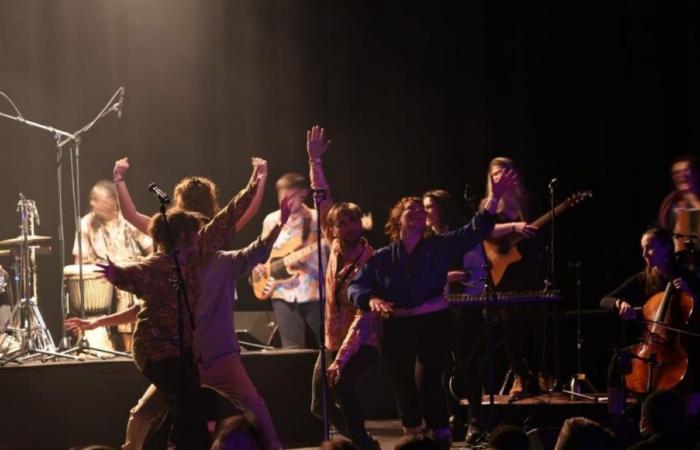We are in the basement of the Théâtre de l’Agora, in Évry (Essonne). Twenty musicians from the four corners of the world have gathered. Everyone brought with them music from their own culture to teach it to others, orally, without a score. A tune – with or without words – that they will arrange together to create a collective work. This concept, which is called Ethno, exists today in around forty countries.
« “Ethno” was invented by Swedes 35 years ago with the idea of perpetuating a form of life in traditional music, explains Lucile Jauffret, Ethno coordinator. In people’s minds, traditional music is often something that belongs to the past but in reality, it is something current, which accompanies daily life. The creators wanted to fight against a form of drift around traditions and nationalism by letting young people appropriate these pieces. »
“We want to modernize Griotism”
Cumbis, singer and griotte, came from Senegal with a song called “Mission”. “ It’s a traditional song that we use in the fields, in the rice fields, etc. To motivate people, when work gets difficultthe singer explains to us. What I come to look for at Ethno is cultural mixing. And as griot, we are heirs so we must pass on. We, modern griots, want to modernize griotism to leave a heritage to our descendants. We too will start writing tunes, songs, so that our grandchildren can continue the path traced by our grandparents. There are things that have already escaped us and that we will surely never find again because they were transmitted orally. »
The chronicle of Aliette de Laleu Listen later
Lecture listen 6 min
“I try to open up traditional music and its understanding”
Throughout this residency, the musicians also learn to be trainers in order to supervise Ethno camps themselves. This is the particularity of Ethnofonik, which is celebrating its 13th edition this year. They are accompanied by two facilitators for this. “ My role is that of the coach, explains Myriam, one of them. It’s up to the musicians to work and we help them make their arrangements, learn the pieces, conduct, etc. Because an orchestra works better if the signs are clear. We talk a lot about teamwork, working with intercultural groups, etc. »
A German student, Maya is Georgian. She participates in Ethnofonik with the aim of organizing Ethno camps in her country. She chose to bring traditional polyphony. “ Traditional Georgian music is known for its vocal polyphonies. And I also wanted to choose something a cappella. So it’s a three-part song that comes from southern Georgia. The main subject of this song is love, which is one of the main themes of traditional songs.explains the musician. I find it very interesting to show a traditional song which is very fixed in Georgia. Besides, people don’t think much about arranging it. But by giving it this opportunity to be arranged here on this stage by my colleagues who are very good musicians, I am trying to open up traditional music and its understanding.»
“What I see at Ethno is that there are musicians who know their traditions very well and who come to share or even promote their music. But there are also other musicians who, like me, know little about the music of their country. I, for example, am Belgian. And even though I knew a few songs, I wasn’t really aware of what existed in my country. At Ethno, I was asked: “What is your music?” And it made me wonder, “Who am I?” “From where am I coming?” “What is my music, my culture?” There are people who leave Ethno with a lot of questions and who, after doing research, come back with traditional music from home.
“I didn’t grow up in an environment with traditional music around me”
Cécile, trumpeter, has been doing this research work for two years. With the other French musicians, she came to present two traditional dances: Bourrées.
The Great Caleidophone Listen later
Lecture listen 50 min
“I didn’t grow up in an environment with traditional music around me. I arrived there through the traditional music of Serbia and Macedonia where there is a large repertoire for the trumpet. And in this way, I began to be interested in the French repertoire that I thought was lost. In truth, there is a whole microcosm in France which has kept this music alive. It’s been two years, thanks to Ethno, that I’ve been interested in it: I’ve been going to dances, to dance and music discovery workshops, etc. It does me a lot of good because I grew up in the Paris suburbs in what we call a “new town”. There are a lot of cultural identities – in the town where I grew up there are more than 200 nationalities – but at the same time, there is no very strong cultural sharing and I feel a little envious of the people who have a strong cultural identity with music, etc. So little by little, I am also reclaiming this identity. In particular, I will search a lot in the directory of the west of France where my family comes from. It’s funny because I found a fairly old collection made in the 70s, I sang it to my grandmother and she knew this song. »






